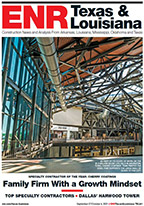Efforts to maintain a steady backlog of work have been challenging for firms working on projects with tighter time lines. Daniel Busch, president of Structure Tone Southwest, Dallas, says that most interiors contractors have been in “survival mode,” but he sees signs of improvement. Last year, the company won a $27-million, 375,000-sq-ft interior fit-out for Denbury Resources. The project involved relocating and consolidating the oil-and-gas company at a new corporate headquarters in an existing facility at The Campus at Legacy in Plano, Texas.
Busch says that in light of the inventory of available existing properties, he expects clients to favor renovations and interiors over base building in the near future. This summer, Structure Tone is working on a consolidation of retailer Fossil Inc.'s headquarters in Richardson, Texas. The 400,000-sq-ft project will merge three buildings into one within a 14-week schedule.
In the data center market, Busch also sees modest growth in the coming year. He terms it a vibrant market that is seeing improvement, but he doesn't expect to see many large data centers built in the near future. “[IT departments] are having a difficult time going to a CFO and recommending a giant data center, but they are able to add on to the ones they have,” he says. “We're seeing them in the $10-million to $60-million range, which is justifiable.”
Within the petrochemical and industrial sectors, Turner Industries Group, Baton Rouge, has stayed relatively flat through the recession. The firm's 2010 regional revenue dipped 4% to $1.56 billion from $1.63 billion in 2009. Stephen Toups, corporate vice president, says some of that change reflects increased competition in pricing. The company is also seeing more activity in its contract maintenance division, which operates at leaner margins, he says. “Clients are looking to get more out of their sites and de-bottleneck issues,” Toups adds.
The executive remains cautiously optimistic for 2011, but sees an improved market in 2012. “There's a lot of pent-up demand that needs to be met,” he says.
Moving Along
Despite intense competition in the transportation sectors, Houston-based Webber saw revenue in Texas increase last year to $599 million from $522 million in 2009. The company landed its fair share of big projects, including $226 million in work on Interstate 35 as well as projects on the $1.5-billion North Tarrant Expressway and the $2-billion I-635 expansion in the Dallas-Fort Worth area.
William Hasbrook, senior vice president, says that while stiff competition is dragging down bid prices, it also creates opportunities. “Companies knew tax revenues would be short, and they bid jobs really tight,” he says. “Because of that, [agencies] ended up with extra money that they need to spend and that's helped us book more work this year.”
Going forward, he says Webber is looking at more airport runway work and is targeting U.S. Dept. of Defense jobs by aligning with firms that hold indefinite-delivery/indefinite-quantity contracts with the military services.
Regional expansion is also a big part of Webber's strategy. Hasbrook says Louisiana and other states in the region will need to be on its radar in the coming years to maintain growth. “If you look at the TxDOT levels in two years, we'd have to grab 60% of the available work to keep at our current level,” he says. “You can't go after that much work without having to buy work at some point and we don't want that.”






Post a comment to this article
Report Abusive Comment